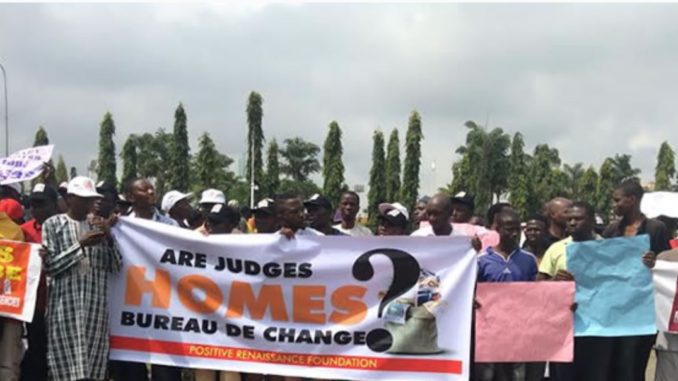
Transparency International’s 2018 Corruption Perception Index, which was released recently, offers yet another fitting opportunity for a close-up shot of the performance of the Muhammadu Buhari government in the fight against graft. For a government that swept into office, brandishing robust anti-corruption credentials, the performance has, regrettably, fallen short of expectations. Three and a half years on, the fight against corruption is suffering some reverses after the gains of the early days.
TI, which defines corruption as the “abuse of entrusted power for private gains,” beams its searchlight on corrupt practices in both public and private sectors. In compiling the index, the global agency is concerned about bribery of public officials, kickbacks in public procurement, embezzlement of public funds and effectiveness of public sector anti-corruption efforts. Based on these, it is possible for a country to score zero points, meaning very corrupt, or 100, meaning very clean – although no country can possibly score 100.
In its current index, the global anti-corruption organisation portrays Nigeria as the 144th most corrupt country out of the 180 surveyed across the world. Compared to last year’s position of 148, it would seem as if there is a marginal improvement; but the country has actually remained static, going by the number of points scored. Nigeria scored 27 points, just as she did the year before. The illusion of improvement is perhaps in the fact that she shared her 144th position with Kenya, Comoros, Mauritania and Guatemala.
It is indeed depressing that the government, by many of its own acts of commission and omission, has deceitfully flunked the fight against corruption, in the eyes of many. When Buhari was sworn in, there were palpable fears that, based on his perceived integrity and zero tolerance for corruption, a lot of people would take their deserved places in jail due to their corrupt antecedents under the preceding government that was deemed to be extremely corrupt. And even more than this, it was expected that the pervasive culture of public corruption would be tamed. None of that. After that initial anxiety, it is now all calm. People are no longer scared of corruption; instead of shunning it altogether, they are rather more discreet. Yet, many still believe that, depending on whose side the perceived corrupt person stands, it is still possible to get away with fraudulent acts.
Although a lot of money has been recovered from corrupt individuals, many still view the fight against corruption as selective and protective of those close to the President. For instance, sceptics are still curious that it took the anti-corruption agency, the Economic and Financial Crimes Commission, about 15 months to file charges against the sacked Secretary to the Government of the Federation, Babachir Lawal; the former Director-General of the National Intelligence Agency, Ayodele Oke, and his wife, Folashade Oke.
Despite being indicted by a three-man panel set up by the President himself, and headed by the Vice-President, Yemi Osinbajo, it took almost an eternity for Lawal and Oke to get the boot. In climes where corruption is viewed with repugnance, their cases ought to have been dispensed with long ago. Perhaps the most bizarre of them all has been the case of Abdulrasheed Maina, the tainted former chairman of the Presidential Task Team on Pension Reform, who was declared wanted on corruption charges but fled the country. The controversy surrounding his return and reinstatement with double promotion is yet to be resolved. While the fugitive said Buhari was in the know of, and actually sanctioned, his return from exile, the Presidency has actually maintained a stoic posturing over the matter. What was supposed to be an opportunity to apprehend a wanted man, alleged to have embezzled about N195 billion, was allowed to slip away.
In another case that would raise eyebrows, a serving senator and former police officer, Isah Misau, alleged that the immediate-past Inspector-General of Police was grossing N10 billion monthly by assigning over 100,000 policemen on private duties to guard individuals and corporate organisations. But, rather than pick up the lead to carry out a thorough investigation, the Attorney General filed criminal charges against the senator. Worse still, following an initial success, the whistle-blowing policy that led to the recovery of billions of looted public funds has now been made too dangerous with whistle-blowers being made to face prosecution. Now, the policy is as dead as a dodo.
Nonetheless, the situation is not without some redeeming features. Buhari has insisted that he would not give up his anti-corruption fight. The President can make a greater impact by making the anti-crime agencies more independent, not having to take actions based on his body language. Moving against certain people because they are in the opposition as was done against the Benue State Governor, Samuel Ortorm, once he left the All Progressives Congress for the Peoples Democratic Party, will only send wrong signals.
As was done by Lee Kuan Yew, the man who transformed the small island outpost, Singapore, into one of the wealthiest and least corrupt in Asia, Buhari can also write his name in gold by changing the perception of people at home and abroad about Nigeria as a corrupt country. When it was rumoured in 1995 that Lee had received improper discount in property purchases, the claim was not only investigated but was debated for three days in the parliament, after which he was cleared. Lee then said, “It is most important that Singapore remains a place where no one is above scrutiny…” In Nigeria, just as in Singapore, nobody should be above scrutiny. It is only then that outsiders’ perception of Nigeria will improve.
END

Be the first to comment